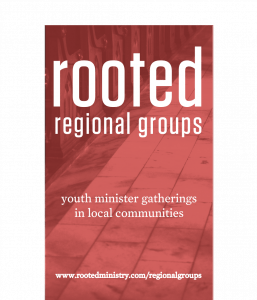Most of us have an image in our minds of the ideal youth leader. Maybe when you think about youth ministry in your church, you imagine the cool college student or the attractive young married couple as best suited to spend time with teenagers. But raising our young people in the faith is meant to be a shared calling among all of God’s people.
If younger Christians are to imitate the faith of their leaders, they will need more than one type of adult in their lives to model faith in a range of callings. This means we may need to re-envision our ideas about what constitutes the ideal youth leader.
Here are five leaders I’m always hoping to recruit for our youth ministry team.
1. The Parent of a Current Student
It’s difficult to imagine youth leaders with more skin in the game than parents of current students. Parents are already the most significant spiritual influence in their children’s lives. They have ready access to their children’s peers, making them effective at contact work. They’re also able to identify immediate needs, since their children are personally affected.
Youth workers should ensure that parental participation will be a good fit for the parents’ own teenagers. I always ask those interested in serving with youth to find out how their children feel before signing on. At the middle-school level, it often works well to have parents serve with their own kids. In high school, though, consider how to give older students space to be vulnerable and to wrestle with big faith questions. If your church is large enough to have small groups for different ages and genders, a parent might lead a group other than their child’s. The parent will then be able to come alongside other youth while still participating in their own child’s world.
Several dads at my church have opted to keep serving with middle schoolers once their children have moved up. They minister beautifully to many students while staying connected to the broader ministry.
2. The Stay-at-Home Parent
Parents who stay at home with their kids make some of the best, most nurturing youth leaders. If their children are school-aged, they may also have capacity to help with administrative tasks, event planning, and contact work with students. Those with younger children often relish the opportunity to interact with a different age group.
One young mom in our church serves on our high-school team. Sometimes she brings her preschoolers along to special events, allowing students to see what it looks like to honor Christ as a busy mom. Other parents have given 10 or more hours per week just to help me—a huge gift of time.
3. The Recent Empty-Nester
The recent empty-nester can be one of the most high-capacity youth leaders. These are the movers and shakers in our ministry. They’ve “launched” their own kids, giving them loads of parenting wisdom from which to draw. Because they tend to be busy professionals and even leaders in their organizations, a youth worker might have to meet with them at 6 a.m., but those early-morning breakfast meetings are well worth the investment.
The recent empty-nester might require a little extra wooing. This age group is sometimes the most intimidated by teenagers, imagining that students won’t relate to them. Youth workers will have to be especially winsome in their assurances that “warm is the new cool.” The recent empty-nester can provide invaluable vision and experience.
4. The Grandparent Figure
Older adults are often overlooked as potential youth leaders, but this shouldn’t be. Deuteronomy 32:7 urges younger people to seek the wisdom and experience of older generations in the community. Older adults generally have time to give—in addition to wisdom. If they have grandkids (or nieces and nephews), they may already be pros at relating to younger people. Certain youth group games may not be up their alley, but their capacity to love and care for students is always a win.
We have a grandparent figure on our middle-school team who often plans hiking and bike outings for students, sharing his love for the outdoors. He has mentored one student well beyond middle school, teaching him important life skills and talking about the faith. An older married couple on our high-school team has shared vulnerably with students about recent health struggles. Our high schoolers adore this precious couple and frequently list them first when we ask for prayer concerns.
5. The Single Person
It’s tempting to fill our teams with married couples or individuals with parenting experience, but don’t neglect single people in your church. Whether young professionals or older adults, singles often have time, energy, and care to give. Their independence often makes it simpler for them to spend time with students outside of youth ministry programs, and they can demonstrate the familial nature of the church in beautiful ways.
Our students are single, and they need to see others walking with Christ in the calling to be single. By actively recruiting singles to serve, we show students that both marriage and singleness are good gifts from God (1 Cor. 7).
Youth workers should note that single people in your ministry will often appreciate time to process their experiences with you. They will likely expend significant energy on behalf of students, and they may need more support from a youth worker. These relationships are among the most life-giving for me, since single leaders are often more available to spend time praying for our students and discussing ministry needs.
The call to befriend and instruct younger people is clear throughout Scripture, and we need the whole congregation—men and women of all stages and walks of life—to be passionately involved in this pursuit. So as you look for those fun college students and newly married couples, be sure to prioritize other godly examples, too. Thinking outside the box helps youth ministries to flourish; your students, after all, need the whole body of Christ.
Is there enough evidence for us to believe the Gospels?
 In an age of faith deconstruction and skepticism about the Bible’s authority, it’s common to hear claims that the Gospels are unreliable propaganda. And if the Gospels are shown to be historically unreliable, the whole foundation of Christianity begins to crumble.
In an age of faith deconstruction and skepticism about the Bible’s authority, it’s common to hear claims that the Gospels are unreliable propaganda. And if the Gospels are shown to be historically unreliable, the whole foundation of Christianity begins to crumble.




































